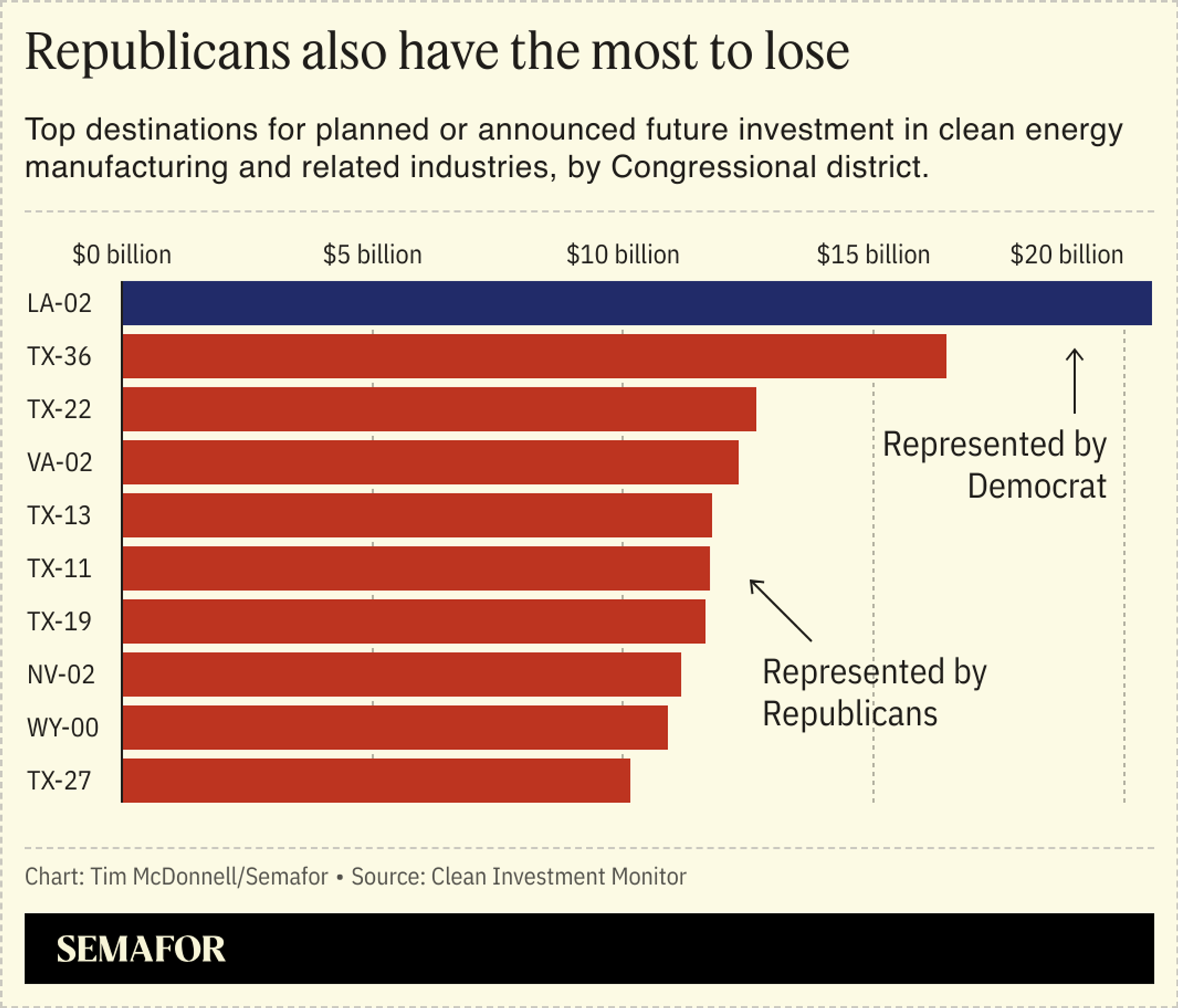The News
US congressional Republicans are poised to test a core tenet of Joe Biden’s climate strategy — that clean energy investments will be politically shielded because most are in Republican districts. So far, the former president’s approach appears to be working.
House Speaker Mike Johnson (R-La.) has promised to hold a vote on a budget bill in his chamber this week, despite opposition from some in his party to planned deep cuts to Medicaid. If it passes, Johnson will still need to iron out some differences with the Senate budget plan adopted on Friday. But the bills could deliver some key fossil fuel policy wins for US President Donald Trump, including an aim to boost federal spending on domestic energy production, which the Senate plan said could be paid for in part by leasing out more acres of federal land for oil and gas drilling. The House is also set to vote this week on whether to roll back several key Biden climate policies, including a fee on methane emissions from oil and gas operations, energy efficiency standards for water heaters, and surveying paperwork for offshore drilling.
In this article:
Tim’s view
The Biden climate legacy looks likely to survive, for now. Clean energy tax credits in the Inflation Reduction Act have not been put on the chopping block, yet. The Senate budget proposal avoids tax issues entirely, and Johnson has so far chosen not to subject the Biden administration’s IRA tax guidance to the same kind of regulatory turnover that he is deploying against methane fees and appliances.
“We expect that most IRA tax credits, grants, and loans will be safe from repeal due to the benefits to Republican districts that those programs offer,” said Emily Tucker, vice president of energy at the consulting firm Capstone.
New data from Clean Investment Monitor, a research group that tracks IRA-linked investment, underscores the depth of Biden’s political insurance strategy. Between the law’s adoption and the end of 2024, $289 billion was invested nationwide in climate-related manufacturing, electricity, and industrial facilities, the report finds. Of that, 77% went to congressional districts represented by Republicans, with Texas and the southeast seeing the most benefit.

The data also reveal that Republicans have more to lose if they cut off IRA tax credits going forward. Of $524 billion in forthcoming investment that companies have announced, the same share, 77%, is destined for Republican districts, the report found. Many congressional Republicans are already getting an earful from constituents frustrated with Trump’s early executive actions; pulling the rug on one of the country’s few strong sources of job creation seems like a risky bet to make with next year’s midterm elections already looming.

Room for Disagreement
Voting decisions are motivated by more than just dollars and cents: Congressional Republicans are likely to face growing tension within their ranks about whether their ideological commitment to Trump and to defeating so-called woke-ism is worth more than manufacturing investments in their districts. Before a budget bill reaches Trump’s desk, it’s still entirely possible that IRA tax credits could face the axe, said Emily Domenech, senior vice president at Boundary Stone Partners and former energy adviser to previous House Speaker Kevin McCarthy (R-Calif.). The House bill has a total spending target of about $4.5 trillion. “They’ve got to find some offsets to be able to hit that spending target, and pay for the policies that President Trump wants,” she said. “The IRA is absolutely in the crosshairs.” Tax credits for EV buyers, she said, are most likely to get cut first.
Know More
House Republicans are also preparing for a potential showdown with Tesla CEO and Trump confidante Elon Musk. Sometime before summer, they plan to vote on whether to withdraw California’s permission to set its own state-level electric vehicle mandates. That program requires automakers to buy credits if they don’t meet certain EV targets; for Tesla, which has always been well ahead of those targets, selling credits to its rivals has become one of the company’s biggest sources of income. Musk has no qualms about seeing EV tax credits cut, since he believes those help his competitors even more than him. But if the California compliance credit market evaporates, it will put even more pressure on Tesla’s thinning profit margins from EV sales.
Notable
- Climate-focused activists and congressional Democrats, meanwhile, lack a clear vision of what their legislative goals in a post-IRA, Trump-led Washington should be. Whatever it is, it won’t be a revival of the Green New Deal.
